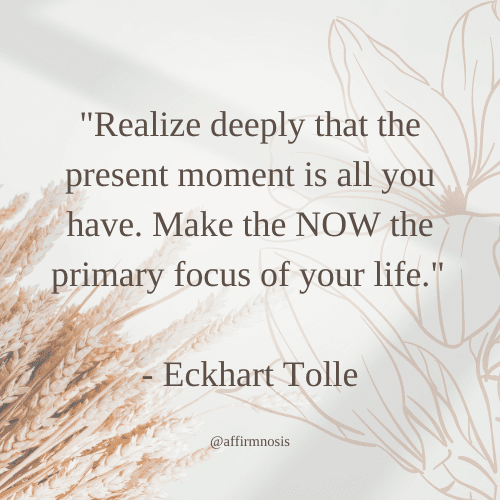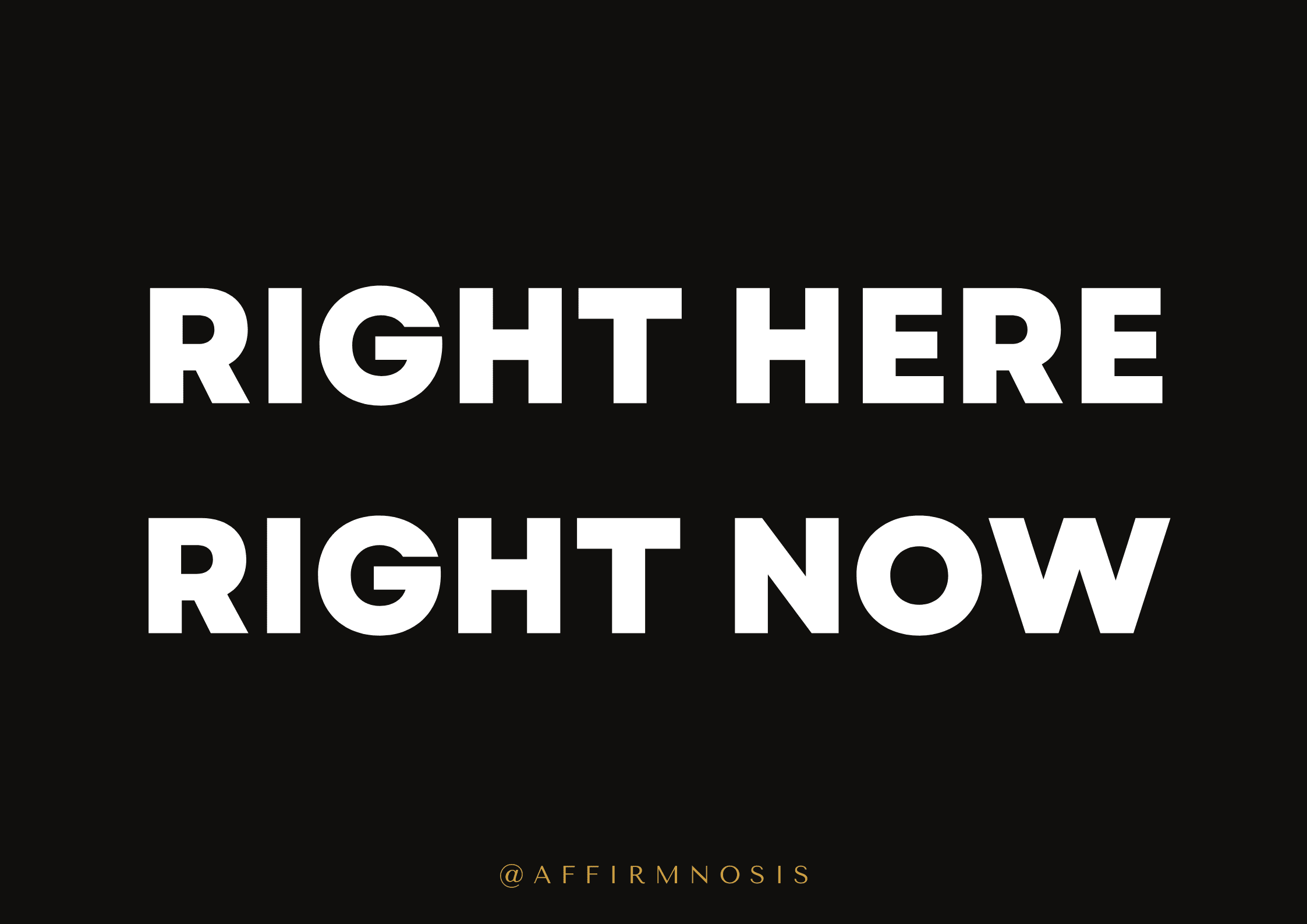Life can pass us by in a blur, with our minds constantly racing ahead to deadlines, tasks and worries about the future. It is all too easy to get caught up in what was or what will be instead of focusing on the present moment. However, learning to be present in the moment has been shown to have a plethora of benefits for our mental and emotional wellbeing.
The Power of Now: Understanding the Concept of Being Present in the Moment
Being present in the moment means fully engaging with whatever is happening right now, whether it’s enjoying a cup of coffee, spending time with loved ones or completing a task at work. It involves being fully immersed in your experiences without getting distracted by thoughts about past or future events.
For many people, this concept may seem difficult or even impossible to achieve. However, it is simply a matter of training our minds to stay focused on what is happening right now.
The benefits of being present in the moment are numerous and have been supported by scientific research. Studies have found that practicing mindfulness and being present can lead to reduced stress and anxiety levels, improved relationships with others and increased focus and concentration levels.
“Eckhart Tolle Life is always NOW”.
Furthermore, it can help us appreciate life more fully, allowing us to enjoy everyday experiences that we may otherwise take for granted. Thus, it’s important that we make an effort to practice being present in our daily lives.
Often times we may get so wrapped up in our busy lifestyles that we forget how valuable each moment can be if we pay attention to it. By acknowledging this concept and embracing its significance within our lives we are able to tap into greater levels of happiness which lead towards achievement as well as success both personally and professionally ultimately leading towards living life purposefully.
Benefits of Being Present in the Moment
Increased Focus and Concentration
Being present in the moment can significantly improve your focus and concentration. When you are fully engaged in what you are doing, your mind is not distracted by other thoughts or worries.
This allows you to give your full attention to the task at hand, leading to better performance and productivity. By focusing on one thing at a time, you can also avoid feeling overwhelmed or stressed.
In addition, practicing mindfulness can lead to changes in brain function that enhance focus and concentration. Studies have shown that regular mindfulness meditation can increase activity in the prefrontal cortex, a region of the brain associated with attention and decision-making.
Reduced Stress and Anxiety
One of the most significant benefits of being present in the moment is reduced stress and anxiety. When we are distracted by thoughts about past or future events, our minds tend to dwell on negative experiences or worry about what might happen next. This can lead to feelings of stress or anxiety.
By focusing on the present moment instead, we can calm our minds and reduce these negative emotions. Mindfulness meditation has been shown to be particularly effective for reducing symptoms of anxiety and depression.
Improved Relationships
When we are present in our interactions with others, we are better able to listen actively and respond appropriately. This leads to more positive communication with others, which can improve relationships both personally and professionally.
In addition, when we are mindful in our relationships with others, we are less likely to be reactive or defensive when conflicts arise. Instead, we can approach difficult situations with compassion and understanding.
Greater Appreciation for Life
Being present in the moment allows us to fully appreciate all that life has to offer. When we are not distracted by worries about past or future events, we can take in the beauty and wonder of the present moment. This can lead to a greater sense of gratitude and fulfillment in our lives.
By practicing mindfulness, we can cultivate a deeper appreciation for the small things in life that we might otherwise take for granted. This can lead to greater happiness and a more positive outlook on life overall.

Mindfulness Meditation: Cultivating Presence Through Stillness
One of the most effective ways to cultivate presence is through mindfulness meditation. This practice involves sitting quietly and focusing your attention on your breath.
As thoughts arise, you simply observe them without judgment and redirect your attention back to your breath. Over time, this practice can help you become more aware of your thoughts and emotions, which can help you stay present in the moment.
To get started with mindfulness meditation, find a quiet place where you won’t be disturbed for at least 10-20 minutes. Sit comfortably with your spine straight and close your eyes or softly gaze at a point on the floor in front of you.
Begin to focus on your breath, noticing the sensation of the air moving in and out of your nose or mouth. If thoughts arise (and they will!), simply observe them without getting caught up in them and redirect your attention back to your breath.
Engaging Your Senses: Exploring the World Around You
Another way to cultivate presence is by engaging all of your senses in the present moment. When we’re caught up in our thoughts, we often miss out on what’s happening right here and now. By using all of our senses – sight, sound, touch, taste, and smell – we can fully immerse ourselves in our experience.
To engage your senses more fully, try taking a mindful walk outside or spending time doing something that brings you joy – cooking a meal from scratch or listening to music without any distractions. As you engage with each sense, notice any judgments that arise (e.g., “I don’t like this song” or “This food is too spicy”) and try to let them go without getting caught up in them.
Deep Breathing Exercises: Finding Calm Amidst Chaos
When we’re stressed or anxious, our bodies react by tensing up and our breathing becomes shallow and rapid. Deep breathing exercises can help us slow down and regulate our breath, which can in turn help us stay present and calm in the moment.
To try a simple deep breathing exercise, find a quiet place where you won’t be disturbed. Sit comfortably with your spine straight and close your eyes.
Take a deep breath in through your nose for a count of four, hold for a count of four, exhale for a count of six, and repeat this cycle several times. Notice how your body feels as you breathe deeply.
Disconnecting from Technology: Unplugging to Reconnect
In today’s hyper-connected world, it can be difficult to disconnect from technology long enough to cultivate presence. However, constantly checking our phones or scrolling through social media can actually distract us from the present moment.
To practice disconnecting from technology, try setting aside specific times each day when you won’t check your phone or engage with social media. You might also consider implementing “tech-free” zones in your home (e.g., no phones at the dinner table) or turning off notifications on your phone to reduce distractions.
By practicing these techniques – mindfulness meditation, engaging your senses, deep breathing exercises, and disconnecting from technology – you can cultivate greater presence in your daily life. Remember that cultivating presence is an ongoing practice that takes time and patience – but the benefits are well worth the effort!
Obstacles to Being Present in the Moment
Living in the present moment can be a challenge, and there are many obstacles that can prevent us from fully embracing the experience. In this section, we’ll discuss some of the most common obstacles people face when trying to live in the moment.
Multitasking
Multitasking is a common obstacle to being present in the moment. Many of us feel like we need to do several things at once just to keep up with our busy schedules.
However, multitasking can actually hinder productivity and prevent us from fully engaging with our surroundings. When you’re trying to be present in the moment, it’s important to focus on one task at a time.
This means putting down your phone or turning off your computer while you’re doing something else. By eliminating distractions and giving your full attention to one task, you’ll find that you’re able to complete it more efficiently and enjoy it more fully.
Worrying about the Future or Dwelling on Past Mistakes
Another obstacle that can prevent us from being present in the moment is worrying about the future or dwelling on past mistakes. It’s easy to get caught up in negative thoughts about what might happen or what could have been, but this type of thinking only distracts us from enjoying what’s happening right now.
To overcome this obstacle, try focusing on gratitude for what you have right now rather than worrying about what could go wrong or regretting past mistakes. Take some time each day to reflect on all of the good things in your life – big and small – and focus on savoring those moments as they happen.
Distractions
Distractions are all around us – from social media notifications to email alerts – and they can make it difficult for us to stay focused on living in the present moment. When we’re distracted, we’re not fully engaged with what’s happening around us, and we miss out on opportunities to fully experience life. One way to overcome this obstacle is to set aside time each day to disconnect from technology and other distractions.
Turn off your phone, close your laptop, and spend some time in nature or engaging in a hobby you enjoy. By eliminating distractions and focusing on the present moment, you’ll find that you’re able to enjoy life more fully.
Living in the present moment can be a challenge, but it’s worth the effort. By overcoming the obstacles that prevent us from fully experiencing life, we can enjoy greater happiness, reduced stress and anxiety, and stronger relationships with those around us. Whether it’s multitasking or worrying about the future that’s holding you back, take some time today to reflect on how you can live more fully in the present moment.
Tips for Overcoming Obstacles to Being Present in the Moment
One of the biggest obstacles to being present in the moment is trying to do too much at once. Many people pride themselves on their ability to multitask, but research shows that multitasking actually decreases productivity and increases stress and anxiety.
Setting Priorities and Focusing on One Task at a Time
To be truly present in the moment, it’s important to set priorities and focus on one task at a time. This means identifying what’s most important and giving it your full attention.
To set priorities, start by making a list of everything you need to do. Then, rank each item in order of importance.
Once you have your list prioritized, focus on one task at a time until it’s complete before moving on to the next item. This will help you stay focused, reduce stress, and ultimately be more productive.
Practicing Gratitude
Another way to overcome obstacles to being present in the moment is to practice gratitude. Gratitude is the practice of focusing on what you’re thankful for in life and acknowledging those things regularly.
When we’re grateful for what we have, we’re more likely to be happy and content in the present moment. To practice gratitude, take some time each day (or week) to reflect on what you’re thankful for – whether it’s your health, your family, your job or something else entirely.
Write down three things you’re grateful for each day or say them out loud before bed. This simple exercise can help shift your focus away from worries about the future or regrets about past mistakes.
Creating a Daily Routine that Includes Time for Relaxation and Reflection
Creating a daily routine that includes time for relaxation and reflection is another way to overcome obstacles to being present in the moment. Many people are so busy that they don’t take the time to slow down and reflect on their lives. By creating a routine that includes time for relaxation and reflection, you can train yourself to be more present in the moment.
To create a daily routine that includes time for relaxation and reflection, start by identifying what activities help you relax. This might be taking a walk outside, practicing yoga or meditation, reading a book or listening to music.
Once you’ve identified these activities, carve out time each day to engage in them. In addition to relaxation, it’s also important to include time for reflection in your daily routine.
This might mean journaling about your day or reflecting on a specific experience. By taking the time to reflect on your life, you’ll be better able to understand what’s truly important and stay present in the moment.
Achieving Presence: A Mindful Outlook
In order to truly overcome obstacles to being present in the moment, it’s important to adopt a mindful outlook towards life. Mindfulness is the practice of paying attention to the present moment with curiosity and without judgment. When we’re mindful, we’re better able to stay focused on what’s happening right now instead of worrying about the future or dwelling on past mistakes.
To adopt a mindful outlook towards life, start by paying attention to your senses – what do you see, hear, feel? Engaging your senses can help bring you into the present moment.
From there, practice deep breathing exercises or mindfulness meditation exercises which will allow you become aware of thoughts that arise and then detach from these thoughts so as not allowing them dictate how we react. By using these tips for overcoming obstacles for being present in the moment along with mindfulness practices discussed earlier in this article – focusing on one task at a time , practicing gratitude and deliberate relaxation/reflection- anyone can achieve presence regardless of how busy they are!
Begin Practicing Being Present in the Moment Today:
It’s easy to get caught up in our busy lives and forget to be present in the moment. However, taking just a few minutes each day to practice mindfulness or engage your senses can make a big difference in your overall well-being.
By being more aware of our thoughts and feelings as they happen instead of getting lost in them or trying to push them away altogether will help us become better equipped at managing our emotions.
We hope this article has inspired you to begin practicing being present in the moment today. Remember that it takes time and effort but with patience you will reap great rewards by becoming more mindful which ultimately helps us lead happier lives full of joy!
Quotes on the topic of being present in the moment:
- “The present moment is filled with joy and happiness. If you are attentive, you will see it.” – Thich Nhat Hanh
- “Life is available only in the present moment.” – Thich Nhat Hanh
- “The ability to be in the present moment is a major component of mental wellness.” – Abraham Maslow
- “Realize deeply that the present moment is all you have. Make the NOW the primary focus of your life.” – Eckhart Tolle
- “The past has no power over the present moment.” – Eckhart Tolle
- “Be present in all things and thankful for all things.” – Maya Angelou
- “The point of power is always in the present moment.” – Louise Hay
- “The present moment is the only moment available to us, and it is the door to all moments.” – Thich Nhat Hanh
- “The present moment is the only time over which we have dominion.” – Thích Nhất Hạnh
- “In the present moment, we are timeless.” – Ram Dass
- “The secret of health for both mind and body is not to mourn for the past, worry about the future, or anticipate troubles, but to live in the present moment wisely and earnestly.” – Buddha
- “Do not dwell in the past, do not dream of the future, concentrate the mind on the present moment.” – Buddha
- “Forever is composed of nows.” – Emily Dickinson
- “The present moment is a powerful goddess.” – Johann Wolfgang von Goethe
- “The only time we suffer is when we believe a thought that argues with what is. When the mind is perfectly clear, ‘what is’ is what we want.” – Byron Katie
- “The present moment, if you think about it, is the only time there is. No matter what time it is, it is always now.” – Marianne Williamson
- “The more I give myself permission to live in the moment and enjoy it without feeling guilty or judgmental about any other time, the better I feel about the quality of my work.” – Wayne Dyer
- “Living in the moment means letting go of the past and not waiting for the future. It means living your life consciously, aware that each moment you breathe is a gift.” – Oprah Winfrey
- “The best way to capture moments is to pay attention. This is how we cultivate mindfulness.” – Jon Kabat-Zinn
- “Mindfulness isn’t difficult, we just need to remember to do it.” – Sharon Salzberg
- “The only way to live is by accepting each minute as an unrepeatable miracle.” – Tara Brach
- “Life gives you plenty of time to do whatever you want to do if you stay in the present moment.” – Deepak Chopra
- “The only time you ever have in which to learn anything or see anything or feel anything, or express any feeling or emotion, or respond to an event, or grow, or heal, is this moment, because this is the only moment any of us ever gets. You’re only here now; you’re only alive in this moment.” – Jon Kabat-Zinn
- “The present moment is filled with joy and happiness. If you are attentive, you will see it.” – Thich Nhat Hanh
- “The only time we suffer is when we believe a thought that argues with what is. When the mind is perfectly clear, ‘what is’ is what we want.” – Byron Katie
- “Life is a succession of moments. To live each one is to succeed.” – Corita Kent
- “The ability to be in the present moment is a major component of mental wellness.” – Abraham Maslow
These quotes emphasize the importance of being present in the moment, mindfulness, and the power of now.
20 affirmations that can help you be present in the moment:
- “Right now, in this moment, I am enough.”
- “I choose to focus on the here and now, not what was or what will be.”
- “This moment is my only moment. I am present.”
- “I release worries about the future and regrets about the past, embracing only the present.”
- “Each moment is a new opportunity for me to be present and mindful.”
- “I am engaged and connected with the world around me right now.”
- “Every breath I take brings me to a deeper level of consciousness and presence.”
- “I have the power to calm my mind and focus on the present moment.”
- “I allow myself to let go of the past, and remain rooted in the present.”
- “I am centered. I am present. I am here.”
- “I embrace the rhythm of life and let it unfold in the present moment.”
- “I am grateful for the beauty and richness of this present moment.”
- “The present moment is filled with joy and happiness.”
- “I am at peace with my past and looking forward to the future, but I live in the present.”
- “This moment is a new beginning, the start of something wonderful.”
- “Every moment is perfect in its own way, and I choose to embrace it.”
- “I am exactly where I need to be in this moment.”
- “In this moment, I am safe, I am grounded, I am present.”
- “I find joy and pleasure in the simplest things around me.”
- “The present moment is my true home. I am comfortable here.”




























































